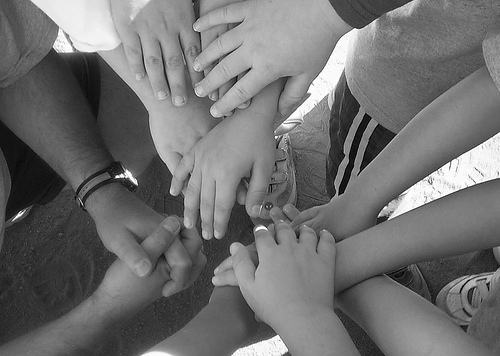The strength of a real team is under-estimated
Project kick-offs have been used for years as a way to launch a new project. It is assumed that bringing people together in a room where the project sponsor presents the project’s objectives and time-lines is a good way to get things going. To be sure that the newly formed team will perform well, some organizations even order sandwiches or sushi and add diet software drinks or beer, and so the project begins.
I really don’t have a strong opinion about project kick-offs but I do see a great opportunity to start building a real-high-performing-team from day one is often missed.
Having been part of great (and not so great) teams over the years, I’m obsessed about creating real teams – the ones we remember forever because we delivered outstanding results while being highly energized, and had a great time doing it. It is similar to the concept of Flow proposed by Mihály Csíkszentmihályi.
Flow is the mental state of operation in which a person in an activity is fully immersed in a feeling of energized focus, full involvement, and success in the process of the activity. [...]
According to Csíkszentmihályi, flow is completely focused motivation. It is a single-minded immersion and represents perhaps the ultimate in harnessing the emotions in the service of performing and learning. In flow, the emotions are not just contained and channeled, but positive, energized, and aligned with the task at hand. To be caught in the ennui of depression or the agitation of anxiety is to be barred from flow. The hallmark of flow is a feeling of spontaneous joy, even rapture, while performing a task[2] although flow is also described (below) as a deep focus on nothing but the activity – not even oneself or one’s emotions.
Colloquial terms for this or similar mental states include: to be on the ball, in the moment, present, in the zone, wired in, in the groove, or keeping your head in the game. Wikipedia.
So back to creating a real strong project team (The Wisdom of Teams: Creating the High-Performance Organization). Why not start with something simple, real simple? Establishing rules and protocols of operation for the team.
As a first step in launching a new team, I usually start with an initial meeting (the duration varies based on the size of the team and the project being undertaken) during which I ask the team members to establish their working protocol – how they wish to work together.
Here are some of the questions the team members need to answer prior to doing anything else – including actually starting the project:
- What do we wish to accomplish together?
- What ground rules will we play by?
- How do we make decisions?
- How long can discussions and debates go on for? Do we use time-boxes in meetings? For decision making?
- How do we resolve disagreements?
- How often do we need to meet? For how long?
- How will we communicate with each other?
- How do we keep track of our action items?
- How do we deal with team members who do not live up to the team’s expectations?
- What rules do we have to include new team members? To expel existing team members?
- How will we know if we are successful as a team?
Some of these questions may appear to be trivial. While establishing a team protocol doesn’t need to take a lot of time (and can easily be combined with a team building activity), not establishing such a protocol will quickly lead to inefficiencies, waste of time, and increased frustration for the team members. Want a few examples?
- Did you ever find out that some project team members’ personal objectives had nothing to do with the project? Trying to motivate those people will drain your energy and your focus.
- Has a detailed technical decision ever been taken by a senior manager with weird consequences? Guidelines may have prevented the decision from being escalated in the first place.
- Have you participated in meetings where key people didn’t show up or showed up late with the consequence of having some decisions over-ruled? Determining up front the rules around meeting attendance and decision making will greatly alleviate such frustrations.
These are only a handful of examples but time and again, I have had the privilege to launch teams on the right foot. The consequences are positive and the cost is minimal. It may not be as cheap as buying sandwiches for the team during the project kick-off but the investment will last much longer.
This content was originally published on Pyxis' blog: Source
